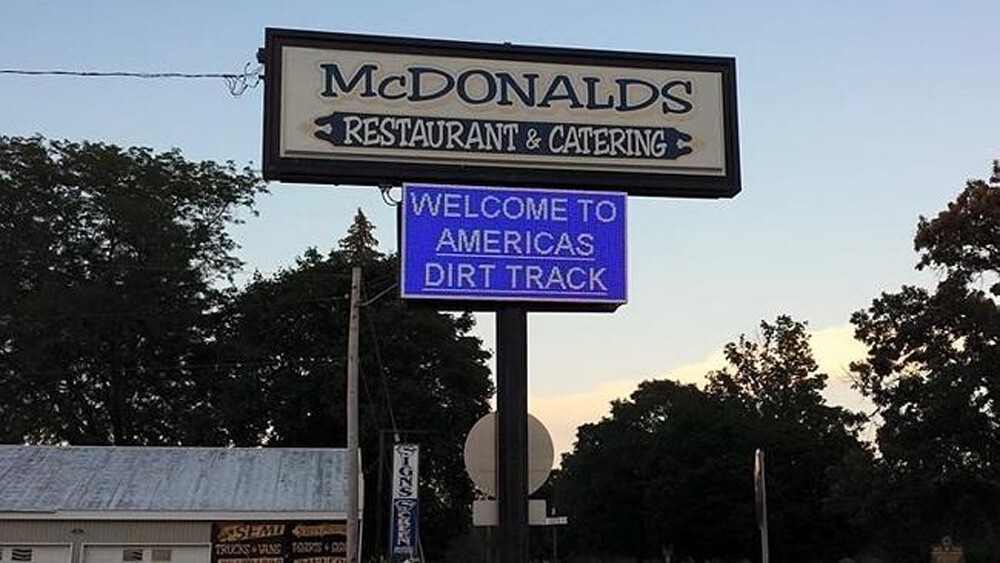5 People Who Got Sued for Being Themselves

Hollister is the name of a 150-year-old city in California. It’s also the name of a clothing brand, owned by Abercrombie & Fitch. Hollister Co.’s branding says the company was founded in the City of Hollister, in 1922, but it was not — it was founded in Ohio, in the year 2000. Abercrombie is so protective of the name that when people in the actual city Hollister sell clothes with the place’s name on it, Abercrombie sometimes takes legal action.
That’s a weird thing to happen to a place with its own identity. It’s weirder when it happens to a person with their own identity. Like happened when...
McDonald’s Went After an Actual Ronald McDonald for Running a McDonald’s Restaurant
Don't Miss
If you open a burger chain today called McDonald’s, you shouldn’t be surprised to receive some pushback from the famous chain of the same name. But we’re here today to talk about McDonald's Family Restaurant in Fairbury, Illinois, which was in a slightly different position from the imaginary restaurant we just described.

via News.com.au
Earl and Dorothy McDonald opened this restaurant opened in 1956, when the McDonald’s Corporation was just starting to really franchise. It took till 1970 for the chain to notice Earl and Dorothy’s place. By this point, the independent restaurant was being run by the son of the original founders, and his name was Ronald. Ron must never provide drive-thru services, the chain told him, and he must never use arches. They continued sending him legal notices for the next 26 years.
In 1992, McDonald’s finally opened a franchise in Fairbury just a mile away from the McDonald restaurant. Locals called the burger place “McDonald’s West” and the family eatery “McDonald’s East.” The chain told Ron he needed to change his restaurant’s name a little. He complied — he changed it to “McDonald Family Restaurant,” without the apostrophe and the S.
Then, four years later, the franchise realized they weren’t succeeding in Fairbury and gave up and left town. McDonald Family Restaurant was able to formally call itself McDonald’s once more, and the life expectancy in Fairbury inched slightly upward.
Kim Kardashian Sued to Stop a Model Who Looked Too Much Like Her
In 2011, Kim Kardashian declared that Old Navy had stolen her likeness for an ad campaign. To give you a complete picture, we’re going to include the ad here, and keep in mind that this was directed at a specific 2011 target demo before you criticize it too hard:
If Old Navy really were trying to convince people the woman there was Kim Kardashian, that sounds legally questionable. If they hired a lookalike to capitalize on Kardashian’s image, that also sounds like the sort of thing we’d have to ask a lawyer about before we’d approve. But consensus says the model in the ad doesn’t look that much like Kim Kardashian. There were plenty of other people at the time who styled themselves more after Kim Kardashian than this actress did.
The actress was Melissa Molinaro, and Old Navy didn’t just pluck her off the street because she looked like Kim Kardashian. She’d been acting for years and had had a singing career in Canada from before Kim Kardashian had entered the entertainment business. In 2010, she’d had a minor speaking role on How I Met Your Mother, which had nothing to do with looking like Kim Kardashian.
Old Navy settled the lawsuit out of court by suspending the campaign, which was surely cheaper than litigating the matter. They also took down the ad from their YouTube channel, but it remains mirrored elsewhere, as all controversial ads tend to do.
Kylie Jenner and a Rival Kylie
If you were hoping the previous story would end with a judge telling Kim Kardashian, “This is stupid, get out of here,” we apologize for denying that to you. Let’s make it up with this next story.
In 2014, Kardashian-adjacent celeb Kylie Jenner sought a trademark on the name Kylie, for “advertising” and “endorsement services.” While these are surely legitimate fields, her quest for such a trademark led to her tussling legally with another Kylie: Kylie Minogue. Like Melissa Molinaro, Kylie Minogue is a singer, but she’s a singer of slightly more fame. She has had number-one albums in five consecutive decades, and having sold 80 million records, is among the best-selling artists of all-time. We even mention her in articles from time to time.
Jenner’s attempts to trademark “Kylie” therefore failed. She did successfully go on to trademark the name “Kylie Cosmetics” in the United States, but then Kylie Minogue went and sold her own cosmetics, and she called this line just “Kylie,” because she was allowed to do that.
Mike Rowe Was Not Allowed to Have His Own Software Site
The following tale is not about Mike Rowe, TV personality and host of Dirty Jobs. It’s about an unrelated Mike Rowe, who was 17 in 2003, and the two Mikes have never sued each other over their names (as far as we know). Instead, young Mike’s problems came when he registered a site called MikeRoweSoft.com.

He planned to use the site for his web design business. Though it wasn’t much of a web design business, given that it was operated by a rising high school senior, it attracted the attention of Microsoft, who sounded the URL out and realized that the result came across as awfully familiar.
The chance of anyone mistaking MikeRoweSoft for Microsoft was approximately zero. But if the company let this slide, who knows what future malicious actor would cite their inaction as proof the trademark was up for grabs?
So, though lawyers initially said Mike had a decent shot at winning, Microsoft got him to relinquish the site. In return, they set up a new one for him. And they gave him an Xbox. “Now, he’ll be locked into the Microsoft ecosystem for years!” they now cackled, as this latest part of their plan came to fruition.
The Girl from Ipanema Was Told Not to Call Herself That
There’s this tune that you’ll keep hearing played in movies, when someone rides an elevator:
Some of you will be shocked to learn that this isn’t solely a movie in-joke, like the Wilhelm scream, but has also been played in elevators in real life. Others will be shocked to learn it isn’t just elevator music, but it’s a legit song, which won Record of the Year at the 1965 Grammys.
Still others will say, “Obviously that’s a real song. That’s ‘The Girl from Ipanema,’ of course!” Well, thanks for ruining the joke, but we have some surprises for you as well. Did you know that this song was about an actual girl, from the actual Ipanema, which is a neighborhood in Rio de Janeiro? Her name is Heloisa Eneida Menezes Paes Pinto, and she’s still alive today. Here’s a photo of her from 2006:

Your mind may be struggling with math now, trying to figure out how someone who looks like that anytime recently inspired a song in the 1960s. She’s 60 in that photo, whether or not she looks it, and she was a 17-year-old in a school uniform walking past a bar when she inspired the songwriters. “The Girl from Ipanema” went on to be one the most famous songs in the world, and Heloisa went on to open a boutique under the same name (“Garota de Ipanema,” in Portuguese).
In 2001, the current owners of the song sued her for using that name. This was absurd. Under U.S. law, song titles aren’t copyrightable. You can even record a new song with the same title as a different one (so long as it doesn’t share other elements), which is why Taylor Swift can do her own “Cruel Summer,” or 50 Cent can do his own “Disco Inferno” without permission from the owners of the song’s famous predecessor.
Perhaps other countries copyright song titles, but “The Girl from Ipanema” shows the complications of doing so. Ipanema is a real place, with real girls, so no one owns that concept. That would be true even if the owner of this boutique were not the Girl from Ipanema, and in this case, she was. So, the court sided with her in this suit.
We’re confident the original songwriters would have sided with her as well, but they were both dead. The Girl from Ipanema outlived them, and will outlive us all.
Follow Ryan Menezes on Twitter for more stuff no one should see.